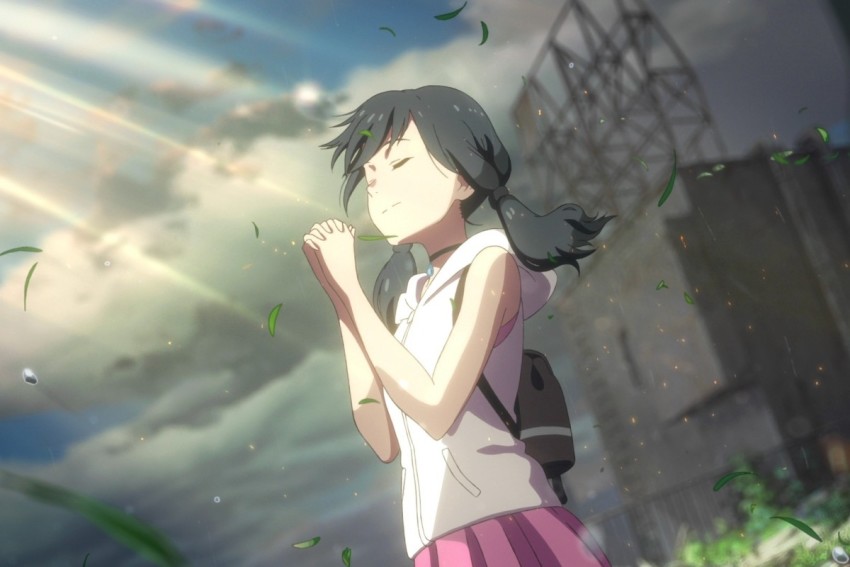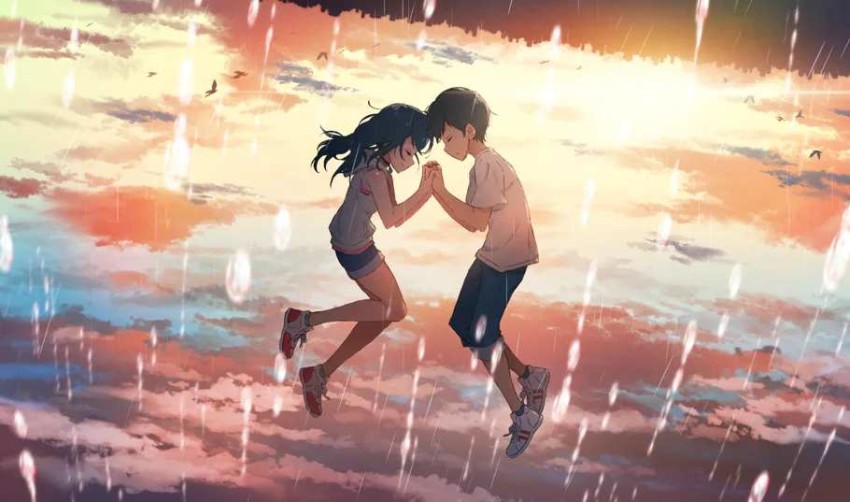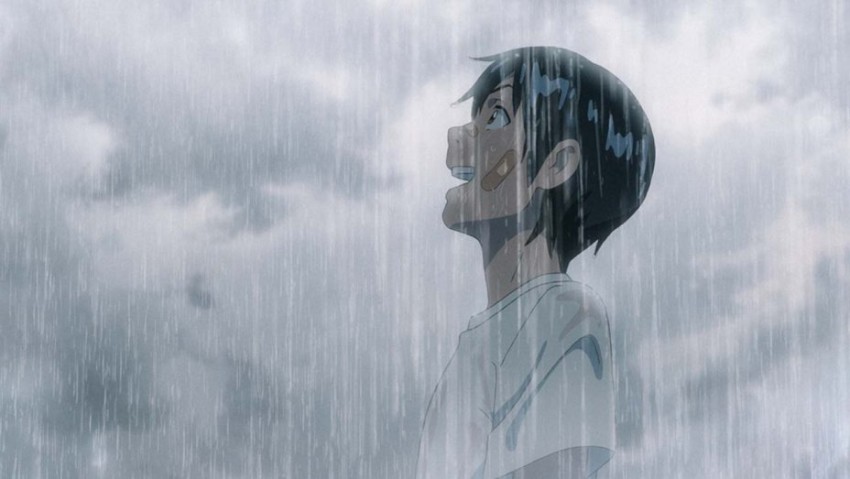100% Perfect Sunshine Girl
December 6, 2019 · 2 comments
By Jonathan Clements.
 Teenage runaway Hodaka (Kotaro Daigo) is living hand-to-mouth in Tokyo, writing for a tabloid newspaper about conspiracy theories and the occult. One magical story seems to come true, when burger-bar waitress Hina (Nana Mori) is revealed to have the ability to control the weather. For a short period, in a limited space around her, she is able to stop the rain, a skill that Hodaka soon puts to use in a bespoke service – for anyone planning a cook-out, wedding or sports meet, the weather no longer needs to be an unknown quantity. Such guarantees, however, come with a heavy price…
Teenage runaway Hodaka (Kotaro Daigo) is living hand-to-mouth in Tokyo, writing for a tabloid newspaper about conspiracy theories and the occult. One magical story seems to come true, when burger-bar waitress Hina (Nana Mori) is revealed to have the ability to control the weather. For a short period, in a limited space around her, she is able to stop the rain, a skill that Hodaka soon puts to use in a bespoke service – for anyone planning a cook-out, wedding or sports meet, the weather no longer needs to be an unknown quantity. Such guarantees, however, come with a heavy price…
The Japanese press notes for Weathering with You tell of Makoto Shinkai and his companions scrabbling around for an international title that encapsulated the themes of their film. One cannot help but wonder if one of the rejected names was 100% Perfect Sunshine Girl, a term much repeated in the film, and also recalling the 1961 Yoji Yamada film The Sunshine Girl (Shitamachi no Taiyo), which starred a young Chieko Baisho as a factory-worked in a dead-end job, seeking to escape to a career as a singer. The film launched the career of Baisho, who provides the voice of Weathering with You’s kindly grandmother nearly sixty years later. But the term’s strongest resonance for Shinkai is surely that of “On Meeting the 100% Perfect Woman One Fine April Morning”, the 1981 short story by Haruki Murakami that echoes throughout much of Shinkai’s work.
Shinkai has made no secret of the heavy influence of Murakami, particularly in such films as 5cm per Second, which charts the many years and miles that separate two people who should have been together, right up until the moment when their eyes meet on opposite sides of a level crossing in Tokyo. He has acknowledged inadvertent similarities between Weathering with You and Murakami’s Kafka on the Shore (2002), which similarly features a runaway protagonist who is thrust into a series of magic-realist happenings.
 Shinkai has long been concerned with the distance between people, and with their struggle to overcome barriers to true love – separated by time, by age, or by simple geography. Just as Murakami expanded his “100% Perfect” short story into the sprawling novel 1Q84 (2009), which featured childhood sweethearts separated by a split in universes, Shinkai hit the big time with Your Name (2016), in which a boy and a girl swap bodies, leaving messages for each other as they try to solve the mystery that has fallen them, which crosses space and, it transpires, time.
Shinkai has long been concerned with the distance between people, and with their struggle to overcome barriers to true love – separated by time, by age, or by simple geography. Just as Murakami expanded his “100% Perfect” short story into the sprawling novel 1Q84 (2009), which featured childhood sweethearts separated by a split in universes, Shinkai hit the big time with Your Name (2016), in which a boy and a girl swap bodies, leaving messages for each other as they try to solve the mystery that has fallen them, which crosses space and, it transpires, time.
Notably, Your Name delivered a happy ending – after repeatedly leaving his endings ambiguous or his lovers not-quite-reunited, Shinkai ensured that everybody left the cinema with a smile. In Weathering with You, he takes things a little further, gently musing whether the idea of love being able to change the world might prove dangerous in the wrong hands.
The inspiration for Weathering with You came from a single line. Shinkai wanted the character of Hodaka to say “I don’t care about the weather. I’d rather have you.” He then plotted out a story that could lead to such a declaration, fixating on weather as the ultimate expression of his micro and macro concerns – a global system that nevertheless affects our lives, moods and decisions on an intimate, daily basis. But such an idea also provides Shinkai with an excuse to revisit many of his earlier obsessions – raindrops, clouds and rays of sunshine, elements that an animator can play with to his heart’s content.
Much of Weathering with You has been inspired by the response to Your Name. Shinkai has spoken of criticisms that the musical interludes in his films felt more like pop videos than integrated parts of the work – a concern he addressed here by collaborating with Yojiro Noda, lyricist for the group RADWIMPS, while the script was still in production. He has also spoken of his personal sense of responsibility – that his previous works had been small-scale entertainments aimed at an audience of hipsters and anime fans, but that Your Name’s summer tent-pole status had taken it to a far wider audience than he was used to. Well aware that Weathering with You was sure to reach a similarly broad market, Shinkai announced a determination to do something more memorable with what for many Japanese ticket-buyers would be their default cinema experience of the year.
Shinkai was plainly unequipped for the fame that Your Name brought to him. He has spoken in interviews of being recognised in the street by enthusiastic fans, but also of overhearing people bad-mouthing his film in public. The reaction of some celebrity critics was particularly tough. Hirokazu Kore-eda, director of the Oscar-winning Shoplifters, diplomatically commented that the film was packed with elements of a hit, “…perhaps too packed.” Yoshiyuki Tomino, the notoriously prickly creator of Gundam, declared that he doubted anyone would be watching Your Name in five years’ time.
 “I asked myself,” a wounded Shinkai told Matt Schley of the Japan Times, “should I make a film my critics will like, or should I make one they’ll hate even more?” The experience of a critical backlash left Shinkai more focussed, confrontational, and determined to tell a story with a greater impact. One also wonders about the deliberately contrary way he appears to have run his production, almost as if taunting the anime old guard with his attitude towards his staff. Whereas old-school anime is strewn with tales of ill-health and burn-out, Shinkai made a point of ordering organic bento boxes, and bussing in massage therapist and acupuncturist to keep his animators happy.
“I asked myself,” a wounded Shinkai told Matt Schley of the Japan Times, “should I make a film my critics will like, or should I make one they’ll hate even more?” The experience of a critical backlash left Shinkai more focussed, confrontational, and determined to tell a story with a greater impact. One also wonders about the deliberately contrary way he appears to have run his production, almost as if taunting the anime old guard with his attitude towards his staff. Whereas old-school anime is strewn with tales of ill-health and burn-out, Shinkai made a point of ordering organic bento boxes, and bussing in massage therapist and acupuncturist to keep his animators happy.
There was a palpable rustle of excitement through the cinema at the film’s UK premiere in October 2019, at the moment when one of Hodaka and Hina’s clients is revealed as a leading character from Your Name. Another shows up in a blink-and-you’ll-miss-her cameo, working as a shop assistant; two more standing in a window, watching the rain with the child they discussed having at the end of the previous film. For any long-term Shinkai fans, such cameos introduce a tantalising prospect – that Your Name and Weathering with You are building blocks of an entire “Shinkai World”, weaving into a rich and overlapping tapestry of interlocking stories. Unfortunately, as with an earlier cross-over character between Your Name and Shinkai’s earlier Garden of Words, chronology and geography don’t quite fit. His most avid fans wasted no time in tabulating on-screen dates and comments from the two films, essentially “proving” that the characters from Your Name could not, or should not have been in Tokyo at the time that Weathering with You took place. Except, of course, there was a bit of jiggery-pokery with alternate realities in the previous film, enough for this one to still offer a chance, however, remote, that all Shinkai’s star-crossed lovers get to watch the same Shinkai sky.
Shinkai describes Weathering with You as consciously part of our era – a recession-hit Japan depicted as seedier than his earlier middle-class idylls, an unforgiving and largely unfriendly Tokyo that recalls the memories of a younger, fresh-faced Shinkai, when he arrived from the Nagano mountains. In particular, he recreates his teenage memories of the famously squalid Kabukicho area of Tokyo, where the teenage Shinkai, new in town, found himself beset by religious preachers and pornographers.
He has spoken of how Tokyo for him began as an impersonal urban jungle, before he began to form memories and friendships that slowly transformed its mean streets into places of reverie and delight. His characters scrimp and save and gather their pennies; they knowingly trade in bargain basement Forteana until Hina’s skill suddenly creates the prospect of powerful, magical traditions. They find themselves in a modern world that has largely forgotten the meaning, power and, indeed, price of ancient sorceries. Such concerns have only made Shinkai’s ending controversial for many viewers – although he delivers precisely the love-conquers-all message that he has been edging towards in many earlier films, an earnest, heartfelt declaration of love brings with it a heavy burden on the rest of the world. Fandom has been divided whether the film’s treatment of weather makes it a film that addresses today’s climate crisis or dismisses it with a wave of the hand.
“There are people actually dying and there’s buildings crumbling and it was just something that moved me so much,” he noted in an interview with Kambole Campbell on the Polygon website. “It’s something I worry about so I wanted to incorporate that into my film, but also have the individual wishes of a boy contrasted with the wishes or the good of the community, and the conflict between that.”
Jonathan Clements is the author of Anime: A History. Weathering with You screens all around the UK later this month.
Liam Quane
December 6, 2019 12:34 pm
Was Jonathan Clements present (and presenting) at the showing of Weathering with You at the Scotland Loves Animation festival?
Jonathan Clements
December 6, 2019 12:42 pm
Yes I was. All kinds of detail about it in the podcast: https://blog.alltheanime.com/podcast55/